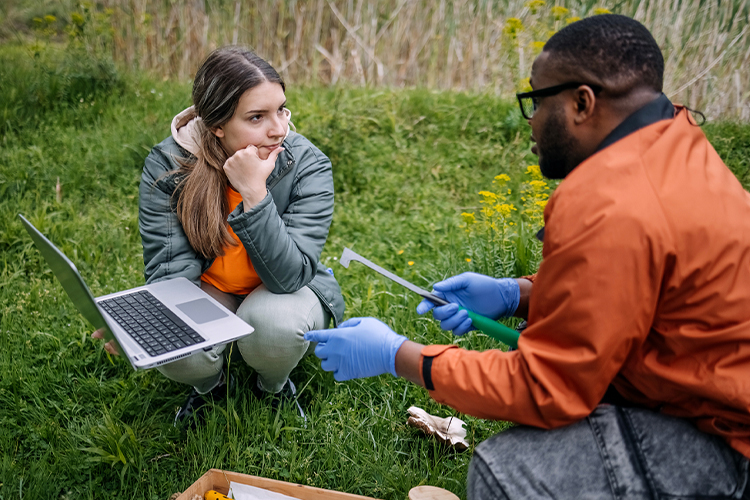Earth matters. A changing environment needs highly educated people who can address both scientific and societal challenges. Nova Southeastern University’s B.S. in Environmental Science program prepares you to help solve the problems created by the impact of human activity on the environment. You’ll gain a comprehensive knowledge of earth’s physical, chemical and biotic systems.
Field studies. Internships. Visits to local ecosystems. NSU is located in an epicenter of biodiversity and development. You’ll experience biology and sociology come alive as you work towards finding solutions to local and global problems. In addition to courses in Everglades ecology, chemistry, and environmental law, you can explore electives that delve into cell biology, biodiversity and geographical information systems.
Why Should You Major in Environmental Science at NSU?
Start Your Career in Government and Nonprofit Agencies
In this professional development program, you'll complete two concentrations. The first is determined by your prior work and college experience. After completing the general education requirements, you'll consult with an academic adviser to select a second concentration that matches your goals. You’ll select courses that best fit your career plans. Rather than study in one discipline or area of focus, you can focus on applied practical studies. This gives you the opportunity to obtain the skills top employers are looking for, giving you a greater advantage.
Learn More About Career Preparation
Shark Destinations
You’ll find NSU environmental science alumni at companies like Fossil Rim Wildlife Center, U.S. Geological Survey, Broward County Board of County Commissioners, Jungle Queen and New York State Parks Recreation and Historic Preservation. They hold titles such as Naturalist, Hydrologic Technician, Research Associate, Environmental Educator and Environmental Scientist. *
*Data provided by NSU’s Office of Career Development
During your undergraduate years, you’ll have a number of hands-on opportunities to
gain real world experience through field studies. These include opportunities to promote
environmental awareness and build skills that will be useful in future professional
and graduate environmental studies.
Additionally, environmental science majors are required to complete an internship
before completing the program. Internships are matched to your interests and serve
as a capstone to your studies.
NSU students enjoy internships at organizations like:
- Zoo Miami
- Marine Environmental Center at the Carpenter House
- Fossil Rim Wildlife Center
- Broward County Board of County Commissioners
- South Florida Water Management District
- Reef Environmental Education Foundation (REEF)
- Frost Science Center
- Broward County Port Everglades
- National Association of Underwater Instructors
- Nova Blance Foreman Elementary School
- Flamingo Gardens
Reserve your seat in one of NSU’s graduate or professional schools while you earn
your bachelor’s degree. With NSU’s Dual Admission program, you don’t have to worry
about competing with thousands of other students for a spot in a highly selective
graduate program. This Premier Program gives you an opportunity to get a head start on your career, so you can start earning
sooner.
Dual Admission Programs
Your NSU professors are dedicated to ensuring that you have a great academic experience.
They regularly review the curriculum to make updates that give you an edge in today’s
ever-changing world. As an NSU Environmental Science major, some sample courses that
you could take include Organic Chemistry, Vertebrate Zoology, Geography of Natural
Resources, Plankton Ecology and Food Web Dynamics. Visit the B.S. in Environmental
Science curriculum to view detailed course descriptions and plans of study.
View Curriculum
During your undergraduate years, you’ll have a number of hands-on opportunities to
gain real world experience through field studies. These include opportunities to promote
environmental awareness and build skills that will be useful in future professional
and graduate environmental studies.
Additionally, environmental science majors are required to complete an internship
before completing the program. Internships are matched to your interests and serve
as a capstone to your studies.
NSU students enjoy internships at organizations like:
- Zoo Miami
- Marine Environmental Center at the Carpenter House
- Fossil Rim Wildlife Center
- Broward County Board of County Commissioners
- South Florida Water Management District
- Reef Environmental Education Foundation (REEF)
- Frost Science Center
- Broward County Port Everglades
- National Association of Underwater Instructors
- Nova Blance Foreman Elementary School
- Flamingo Gardens
Reserve your seat in one of NSU’s graduate or professional schools while you earn
your bachelor’s degree. With NSU’s Dual Admission program, you don’t have to worry
about competing with thousands of other students for a spot in a highly selective
graduate program. This Premier Program gives you an opportunity to get a head start on your career, so you can start earning
sooner.
Dual Admission Programs
Your NSU professors are dedicated to ensuring that you have a great academic experience.
They regularly review the curriculum to make updates that give you an edge in today’s
ever-changing world. As an NSU Environmental Science major, some sample courses that
you could take include Organic Chemistry, Vertebrate Zoology, Geography of Natural
Resources, Plankton Ecology and Food Web Dynamics. Visit the B.S. in Environmental
Science curriculum to view detailed course descriptions and plans of study.
View Curriculum


